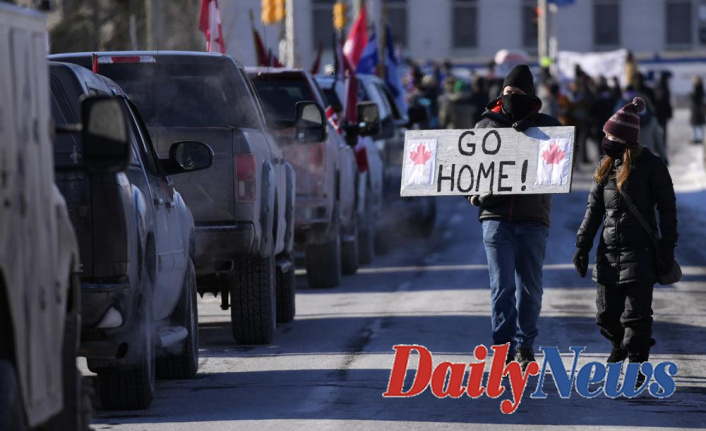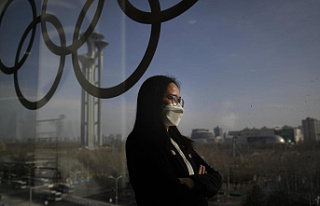This ended a demonstration against COVID-19 restrictions which had hurt both countries' economies. However, they resisted a crackdown in Ottawa, where there was a larger demonstration.
Ottawa was paralysed by protestors. Residents were furious at police inaction and put pressure on Justin Trudeau, Prime Minister.
Demonstrations have been heard across Canada and elsewhere, with similar convoys being held in France, New Zealand, and the Netherlands. According to the U.S. Department of Homeland Security, truck convoys could be coming to the United States.
According to Windsor police, between 25 and 30 people were arrested. Seven vehicles were towed shortly after sunrise near the Ambassador Bridge which links their city with Detroit -- and many other Canadian auto plants -- just after dawn.
"Today, our national economy crisis at the Ambassador Bridge was over," stated Windsor's Mayor Drew Dilkens. He expressed optimism that the bridge would reopen on Sunday. "Border crossings are going to reopen once it is safe to do so, and I will leave that decision to the police and border agencies."
The bridge was closed due to a snowstorm in the area. Windsor Police Chief Pamela Mizuno did not offer any timetable for the reopening of the bridge.
She stated that there are steps she needs to take to reopen roads so they don't face the same problem again at a news conference. "We must ensure that we can maintain traffic flow."
After police forced protesters to remove the pickup trucks and cars that they used to block the crossing, which receives 25% of all trade between both countries, only a few protesters remained.
The administration of U.S. President Joe Biden acknowledged Sunday the peaceful resolution of the protest, which it claimed had "widespread detrimental impacts" on "lives and livelihoods" of both sides.
"We are ready to support our Canadian counterparts wherever necessary in order to restore the normal free flow commerce can resume," Dr. Liz Sherwood Randall, Homeland Security Advisor, said in a statement.
The city of Ottawa is located approximately 500 miles northeast from Ottawa. Mayor Jim Watson announced Sunday that the city had reached a deal to accommodate protestors who had clogged the streets for over two weeks. They will be allowed to move out of residential areas within the next 24 hours.
Watson stated that he would meet with protestors if they kept their demonstration to Parliament Hill and moved their trucks and other vehicles from residential areas by Monday noon. Protest organizers responded that they would comply.
Watson also wrote to protesters, stating that residents are feeling "exhausted" and "on edge" from the demonstrations. He warns that businesses may be forced to close permanently due to disruptions.
Police said that there were approximately 4,000 protestors by Saturday. A counter-protest was organized by frustrated Ottawa residents to stop the trucks from entering downtown.
Clayton Goodwin (45-year-old veteran of the military) was one of the counter-protesters. He said that it was now time for residents to protest the protesters.
Goodwin, the CEO of the Veterans Accountability Commission (a non-profit advocacy group), said, "I'm horrified other veterans would be down there cooopting my flag and co-opting our service." It's a grift. It was completely free. We're 92% vaccinated. We are ready to help our businesses."
Colleen Sinclair, another counterprotester, stated that the demonstrators have had enough time for their discontent to be heard and they need to move on. If necessary, she said it with police force.
"They're occupiers. She said that people are too afraid to go to work and too afraid to leave their homes. This is not the way to make your voice heard. This is domestic terrorist and we want you to leave our city. Get back home.
To the dismay of residents, the city has witnessed similar protest expansions on previous weekends. People milled around downtown, where anti-vaccine demonstrators had been stationed since January.
Shannon Thomas, 32, a teacher, said that it felt like she was in another country. It's just really sad to see so many people waving Canadian flags, acting like patriots. This is the most embarrassing and sad thing I've ever witnessed.
Trudeau has rejected calls for the military to be used, but had stated that all options were available to stop the protests. Trudeau called the protesters a "fringe of Canadian society." Both provincial and federal politicians said that they cannot tell police what to do.
Major-General Steve Boivin of Canadian Special Operations Forces Command stated Sunday that two soldiers from his special forces were involved in protests in Ottawa. He said they were "in the process of being released" from their service. Boivin stated that the activities are against the values and ethics of the military.
on Friday ordered the end of the blockade at Windsor's crossing. Ontario Premier Doug Ford declared an emergency, allowing fines up to 100,000 Canadian dollars as well as imprisonment for those who illegally block roads, bridges, walkways or other critical infrastructure.
On February 7, partial closures of the bridge were initiated. By midweek, the disruption had become so severe that automakers started to reduce or stop production. This standoff occurred at a time when industry is already having trouble maintaining production due to shortages of computer chips from pandemics and other disruptions in supply chains.
Eunice Lucas-Logan, a Windsor resident, said that she is protesting the government's taking away of her rights. "We want to remove the restrictions. We will have to wait and see.
For the past four days, the 67-year old has been supporting the protest. She expressed gratitude for the patience of police officers.
A major truck crossing was shut down on the other side of Canada, between Surrey, British Columbia and Blaine Washington. This closure came a day after Canadian authorities stated that a few vehicles had broken through police barricades. Also, a large crowd had entered the area via foot.
Four people were arrested by the Royal Canadian Mounted Police for "mischief" in protest on Sunday afternoon. Some of those who stayed over had left but they were not allowed to cross the border or use the roads around the area.
The border blockade that started in Coutts (Alberta), north of Sweet Grass (Maine) on Jan. 29 remained intact. According to RCMP Cpl. Troy Savinkoff stated.
Savinkoff stated that officers also disabled three excavators being brought to the protest.
He said, "Had they made it to the blockade? It would have only compounded our unfortunate situation at the border."
While protesters decry vaccine mandates for truckers, and other COVID-19 limitations, many of Canada’s public health measures such as mask rules or vaccine passports to get into restaurants and theatres are already disappearing as the omicron surge increases.
About 90% of Canadian truckers are currently vaccinated. Trucker associations and large-rig operators have condemned the protests. Trudeau could lift the ban because the U.S. has the exact same vaccination rules for truckers crossing the border.
Pandemic restrictions in Canada have been much stricter than those in the U.S. but Canadians have generally supported them. The COVID-19 death rates are one-third of those in the United States.
During an interview on Sunday with Lester Holt of NBC, Biden was critical when asked about the possibility that some might object to the NFL's mask mandate.
He said, "I love the way people talk about personal liberty." He said, "If you exercise personal freedom and put another person in danger, or their health in jeopardy then I don't think that's a good thing with freedom."












